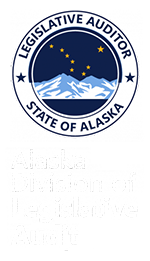| SUMMARY OF: | A Performance Review of the Department of Revenue, Alaska Mental Health Trust Authority Asset Management and Other Select Issues |
Why DLA Performed This Audit
The audit was requested in response to allegations that the Alaska Mental Health Trust Authority (Authority) was not managing its assets and conducting its business in compliance with applicable laws.
Report Conclusions
The audit concluded that the Authority’s board of trustees violated State statutes and terms of the State v. Weiss settlement by diverting $44.4 million in cash principal from the Alaska Permanent Fund Corporation (APFC). Alaska statutes clearly and unambiguously command that cash principal be managed and invested by the APFC. Despite the requirement, the Authority’s board of trustees suspended transfers of cash principal to the APFC for almost 10 years. The board of trustees’ actions appeared to be well intentioned, driven by a desire to maximize revenue for use by beneficiaries. However, the actions did not comply with law and were contrary to the roles and responsibilities outlined in the settlement.
Instead of transferring cash principal to the APFC for investment, $39.5 of $44.4 million was directly invested in seven commercial real estate properties (five located out-of-state) using the Trust Land Office (TLO) to facilitate the commercial real estate investment transactions and to manage the properties. Six of the seven properties were mortgaged and the proceeds were used, in part, for additional commercial real estate investments. The audit concluded that the TLO does not have the legal authority to manage commercial real estate investments. In accordance with the settlement and State law, investment is a function of the APFC. Furthermore, in approving these investments, the Authority’s board inflated investment costs and reduced the asset diversification of the Trust portfolio as a whole. It is more appropriate and efficient to carry out commercial real estate investments via the APFC.
The remaining $4.9 million in diverted cash principal was used for land development activities, including constructing and developing properties primarily used by beneficiary programs.
Because statutes require cash principal be managed and invested by the APFC, the only potential funding mechanism available in statutes for land development activities is Trust income. Development activities funded by cash principal included the mining exploration of Icy Cape. As of FY 17, the TLO had spent a total of $1.6 million in cash principal for Icy Cape mine exploration, and the board of trustees approved another
$3 million for additional exploration activities.
In 2017, the Authority’s management proposed draft legislation to its board of trustees to allow for the use of cash principal to purchase and develop real estate through the TLO and to ratify similar actions previously taken by the board. Public record provides no evidence that the Authority’s management or board of trustees considered the proposed statutory changes in context of the settlement. The audit concluded that proposed changes to the Authority’s statutes constitute a material change to statutes that present a substantial risk of provoking successful litigation to void the settlement agreement if the proposed changes become law.
As part of this audit, an investment firm was hired to evaluate the Authority’s asset management policies for compliance with State investment law and industry best practices. The contractor concluded that the policies fall short in several areas including: lack of an entity-wide perspective that addresses all Trust assets; lack of guidance for the TLO’s commercial real estate investment program; and failure to provide a rationale for using the TLO as a real estate investment manager at the time the investment decisions were made.
The audit concluded that the Authority’s board of trustees did not comply with the Alaska Executive Branch Ethics Act, Open Meetings Act, and the Authority’s bylaws when conducting its business. Evidence showed that multiple trustees were, at times, intentionally trying to avoid discussing board business in a public manner. Other times, evidence showed the board failed to recognize the importance of or need for adhering to State laws when conducting and noticing its meetings.
The review of Authority activities and relationships did not identify less than arm’s length transactions. However, the audit found several employee and trustee professional and personal relationships that created an appearance of related parties or increased the risk of fraud or abuse. The audit found no indication that Authority financial statements materially misstated TLO-managed assets.
Findings and Recommendations
- The Authority board of trustees should stop investing in commercial real estate through the TLO, consult with the APFC on the treatment of commercial real estate investments acquired to date via TLO, and transfer the Trust Authority Development Account’s cash principal balance to the APFC.
- The Authority’s board of trustees should fund future program-related investment (PRI) activities from the Trust income account and reconstitute the APFC with cash principal used on PRIs to date.
- The Authority’s board of trustees should work with the Authority and TLO management to revise the Asset Management Policy Statement and Resource Management Strategy to incorporate industry best practices and facilitate compliance with State investment laws.
- The Authority’s board of trustees and chief executive officer should design and implement written procedures to ensure trustees comply with the Alaska Executive Branch Ethics Act, the Open Meetings Act, and Authority’s bylaws.

